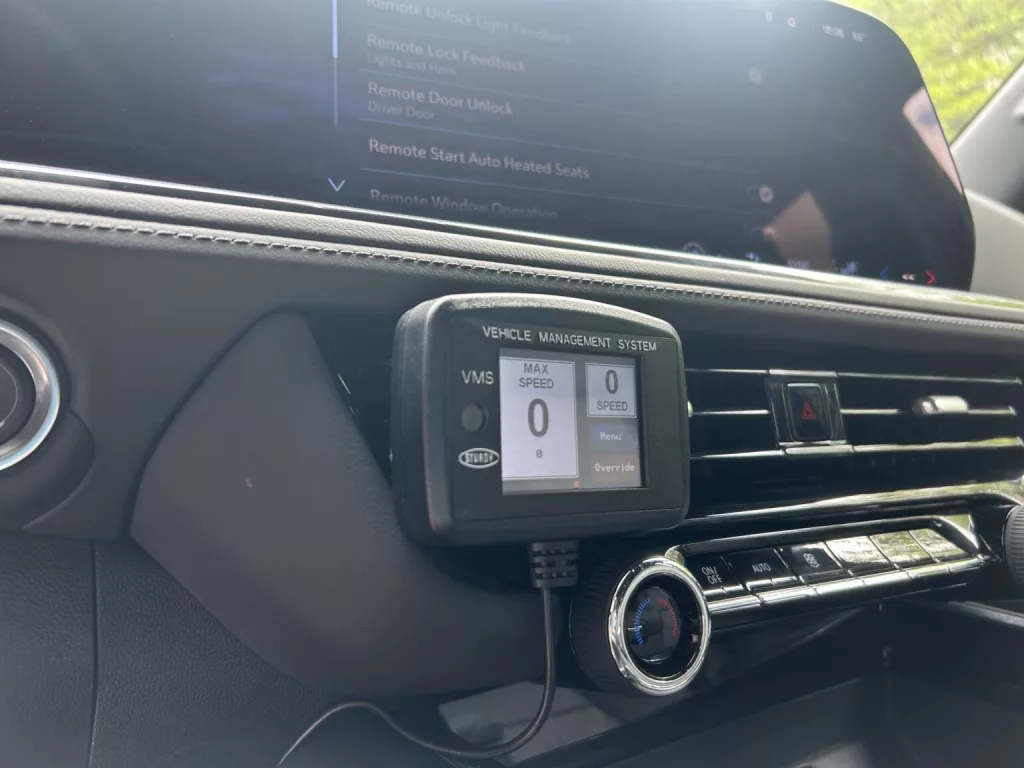OLYMPIA, WA – In a few years, with the help of technology, prolific speeders in Washington won’t be able to drive as fast as they want.
Gov. Bob Ferguson on Monday signed House Bill 1596 into law, requiring a new speed-limiting device as a condition to getting a restricted driver’s license after getting it suspended for reckless driving or excessive speeding.
Judges can also require the speed limiters as a condition of pre-trial release or post-conviction probation.
The tech, shown at a demonstration at the Capitol on Monday, is similar to ignition interlock devices that require people with histories of drunk driving to blow into a breathalyzer to show their blood alcohol concentration before they can start the car.
These new devices use GPS to restrict speed to the posted limit. Under the legislation, drivers could override the limiter three times per month.
The bill received bipartisan support in the Legislature as the state aims to turn the tide on traffic deaths after reaching a 33-year high in 2023. Of the 809 deaths that year, a third involved speeding drivers.
“What’s behind this bill is a really simple goal, which is to save lives,” Ferguson said.
The new law is known as the BEAM Act, named after four people killed in a crash last year with a speeding driver near Renton: Boyd Buster Brown, Eloise Wilcoxson, Andrea Smith Hudson and Matilda Wilcoxson.
Last month, a judge sentenced the driver in the case to 17½ years in prison after he pleaded guilty to four counts of vehicular homicide in the high-speed crash.
The driver was held up as an example of someone who would’ve needed to install a speed limiter. In the prior 10 months, he had reportedly been involved in two crashes in which his speeding was a factor.
Before signing the BEAM Act, the governor met with families of those killed in that crash and others who are pushing for stronger traffic safety measures.
“It’s the family members who got us to this day,” said prime sponsor Rep. Mari Leavitt, D-University Place. “They’re the ones who were willing to share their story over and over again.”
In Europe, new vehicles are required to have intelligent speed assistance technology installed.
But in the United States, the speed limiter idea is new.
Last month, Virginia became the first state to enact such legislation, requiring intelligent speed assistance devices for drivers convicted of going over 100 mph. Georgia quickly followed, with a bill awaiting the governor’s signature.
Last year, Washington, D.C. approved a “speed governor” requirement for repeat offenders.
Lawmakers in several other states have also considered the requirement. In California last year, Gov. Gavin Newsom vetoed a measure requiring passive speed limiters.
Washington’s legislation defines excessive speeding as 20 mph above speed limits over 40 mph, or 10 mph above speed limits under that threshold.
If a driver has a history of moving violations, including excessive speeding, they would have to use an intelligent speed assistance device for 120 days after getting their license back from a suspension. In reckless driving cases, that rises to 150 days. Driving without one during this probationary period would be a traffic infraction that could add 30 days to a license suspension.
Tampering with the device is a gross misdemeanor.
Drivers would have to pay to install and remove the speed limiter, and an additional $21 per month. That monthly fee would go to the state Department of Licensing to offset the costs for low-income people who need the devices but can’t afford them.
The legislation doesn’t go into effect until Jan. 1, 2029.
Washington State Standard is part of States Newsroom, a nonprofit news network supported by grants and a coalition of donors as a 501c(3) public charity. Washington State Standard maintains editorial independence. Contact Editor Bill Lucia for questions: info@washingtonstatestandard.com.





